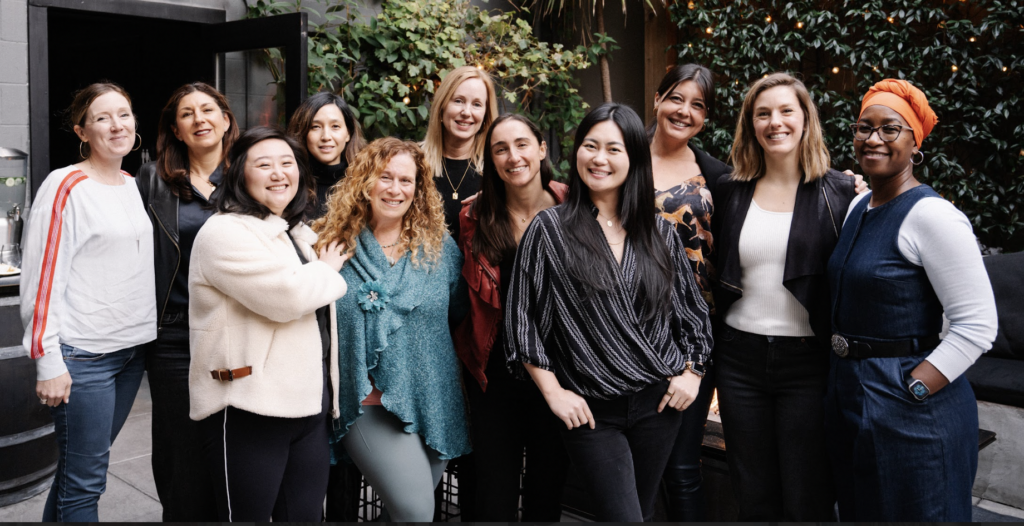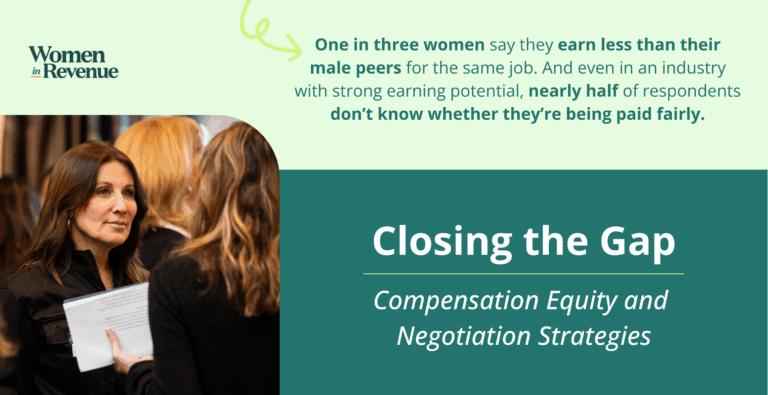Each day presents opportunities for women in leadership roles to widen the door, smooth the path for other women, and facilitate the ability for more women to find positions where they are valued, respected, and fairly rewarded.
At Women in Revenue, our 6,000+ members fuel, nurture, support, and advocate for one another and their colleagues every single day. Regardless of where you are on the corporate ladder, there are impactful ways to show your support and really make a difference in women’s careers. Here are three ideas.
Amplify women’s voices and contributions
Be intentional about creating spaces and amplification within the workplace to ensure that other women beside you and behind you can excel. By leading through example and purposefully creating opportunities that help us all succeed, we can shift the way women are perceived, heard, and valued at work.
Here are a few things you can do to amplify, celebrate, and elevate women in your workplace.
- Make space at meetings. When you notice women who rarely speak up in meetings or are talked over, make it a point to ask for their input. If you’re running the meeting, give them time on the agenda. If you notice an idea has been taken by someone else, speak up. It can be as simple as saying, “Jackie, I remember you mentioned this idea last week. Can you share more about how you would approach it?”
- Share success stories. It can also be difficult for some women to give themselves the pat on the back they truly deserve — or to even recognize when they deserve it. Give your female employees and colleagues verbal congratulations in meetings. Share success stories on Slack or Teams. Mention the success to other leaders at the coffee machine or when chatting online.
- Engage women who are withering at work. When women aren’t challenged or allowed to do the work they are qualified for, are interested in, and excel at, they likely have one foot out the door. If you notice someone seems bored or disconnected, learn what she’s interested in doing. Then consider whom you can connect her with, if you can recommend her for upcoming projects, or any learning opportunities that will lead to skill growth, better visibility, and career advancement.
- Create interdepartmental connections. As Women in Revenue demonstrates, we’re stronger together! Invite women from other departments to join in a monthly coffee talk or quarterly lunch so that you can learn from one another, support each other, and build bridges that lead to new opportunities.
Provide mentorship and allyship
Mentorship and allyship are so important in the modern workplace, especially as organizations increase their focus on diversity, equity, and inclusion (DEI).
Research from Harvard Business Review indicates women often benefit more than men from having a group of close female contacts. To advance to higher-paying executive positions, the study found women had to have a tight network of female connections — even if they had the exact same skills and qualifications as their male counterparts.
As the researchers put it, “because women seeking positions of executive leadership often face cultural and political hurdles that men typically do not, they benefit from an inner circle of close female contacts that can share private information about things like an organization’s attitudes toward female leaders, which helps strengthen women’s job search, interviewing, and negotiation strategies.”
Our organization focuses on mentorship and allyship for this very reason. Our 2022 State of Women in Revenue Report, “The Great Renegotiation,” finds that many women are yearning for mentorship in the workplace. Nearly a third (30%) of our survey respondents reported that lack of mentorship was a challenge in their companies. Yet organizations that lack mentorship programs are missing out on a great opportunity: 67% of businesses with a mentorship program report an increase in productivity.
Mentoring involves a time commitment to nurture a meaningful relationship and not everyone can do it effectively. But most people can be effective allies. Touting women’s contributions to projects or business process improvements, challenging someone when they call a female colleague “bossy” or “aggressive,” and advocating for big and small changes that help women balance workplace and personal demands more effectively are all ways we can be allies to one other in the workplace.
Step in when you can
It can be difficult to speak up when we see something amiss in the workplace, but it’s crucial for creating the kind of culture where women can thrive. In our survey, 25% of women in professional services and revenue operations said sexual harrassment was one of their top three challenges. Across all respondents, women of color unfortunately faced the biggest challenge with harassment. It’s also an unfortunate irony that the same women who are most likely to be harrassed also face the widest pay gap in the workplace.
We have to shine a light on this issue and step in when we see microaggressions or outright harassment in the workplace. We recognize that for some women, it may feel dangerous to speak forthrightly about a harasser or to go to HR. You may fear retaliation or be the recipient of similar treatment.
But there are subtle ways to help, such as:
- Interrupting an uncomfortable conversation with a work-related request.
- Making yourself present as much as possible so that a colleague isn’t alone with someone who makes her nervous.
- Checking in privately with co-workers who may not feel like they have the power to report or stop their harasser’s behavior or a boss’s microaggressions.
- Keeping notes when you see harassment and offering to be a witness for an HR report, if you can.
Actions like these can help slow down the normalization of bad behavior in the workplace.
Women Supporting Women at Work: Together, We Succeed!
Whether it’s allyship, mentorship, confronting harassment, or amplifying women’s voices, there are so many ways women can empower other women to achieve their goals. By reaching back as they climb — or simply standing shoulder to shoulder with talented colleagues — women can uplift other women and help them succeed in the workplace.




